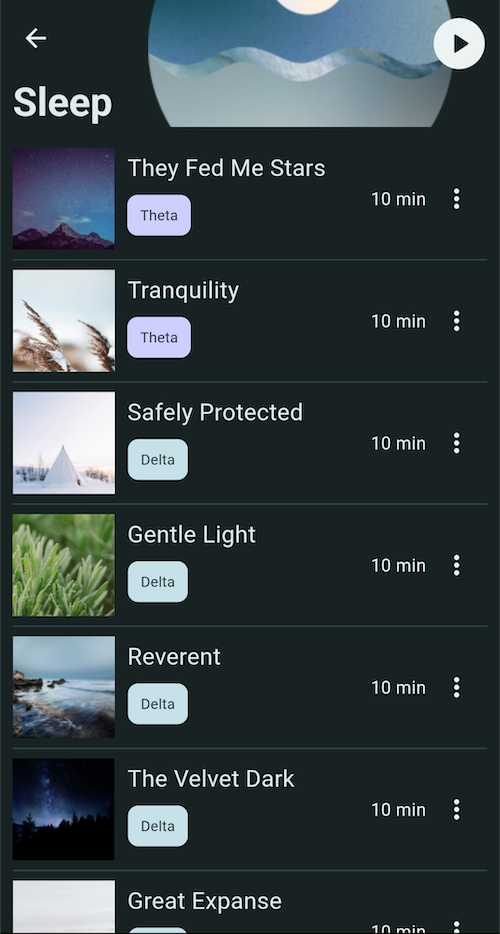How This Calm Music Playlist Actually Sends You Straight To Sleep

The covers are lying heavy on your body. Too heavy.

Can music help insomnia?
You pull one arm out from underneath the covers. Deep sigh.
A few minutes later, you roll onto your side. Maybe this curled position will help?
Still no. Sleep eludes you.
Frustration rising, you grab your phone and turn to Dr Google.
Desperately looking for solutions to your insomnia.
You search for things like “Does music help you go to sleep?”
“Does sleep music actually work”, and finally “What music is best for sleeping?”
The good news is, music can help you fall asleep.
But first, you need to understand your brain during sleep…
What happens to the brain during sleep
Your brain contains billions of neurons that use electrical signals to communicate.
Neurons fire together to send signals to other neurons. And the resulting patterns form brain waves.
Brain waves are measured by their frequency per second, or in Hertz (Hz). And there are five types of brain waves that range from very slow to very fast.
During restful sleep, you produce two dominant brain waves.
Theta waves and Delta waves. These waves are on the slower end of the spectrum.
When Theta brain waves are dominant, you’re often in REM sleep, or deep in meditation. They have a frequency between 4-8 Hertz.
Benefits of Theta brain waves include:
- deep calm
- improved meditation
- REM or dreaming sleep

Delta brain waves are the slowest type of brain wave.
When Delta brain waves are dominant, you’re in a state of deep, dreamless sleep. They have a frequency between 1-4 Hertz.
Benefits of Delta brain waves include:
- deep, restful sleep
- healing and pain relief
- neurological regeneration

When you have restful sleep, you naturally cycle through Theta and Delta brain waves.
This cycle usually lasts about 5-6 hours, giving you a deep and restorative sleep.
So when you access those deep, slow brain waves? You access all of the benefits of refreshing sleep.
How music helps you fall asleep
It’s easy to imagine that sleep is an off switch. But sleep isn’t a light bulb.
Sleep is a sunset. A gradual descent into deep rest.
And in order to bring this sleep cycle on easily, you need to soothe your nervous system and wind down before you go to bed.
Winding down at night, especially with a restful bedtime routine can help your mind & body prepare for a restful sleep.
Plus calming the nervous system is important for physical and mental health. And music is a fantastic way to relieve stress & wind down.
But how does music help you fall asleep?
Because of the science of entrainment.
.png)
Entrainment refers to the synchronisation of organisms to an external perceived rhythm.
In simple terms? Your brain & body integrate musical patterns with your own biological rhythms.
Sometimes those rhythms are obvious - like tapping your foot along with the beat, or dancing the Tango. But some entrainment rhythms are more subtle.
Music may entrain your heartbeat. Music may even reduce stress hormones.
And the most helpful way music can help you sleep? Is by listening to meditones®.
The best calming music to fall asleep to
Meditones are binaural beats combined with beautiful ambient music.
When two slightly different frequencies of sound combine, they create a humming vibration.
And when you listen to this vibration in headphones? It’s fascinating how the brain responds. It creates an auditory perception called binaural beats.
Instead of processing the sound via the auditory cortex? The entire brain works in unison to create calm brain waves.
Like ones you produce during relaxation, meditation and restful sleep.
![[Illustration of a person wearing headphones listening to Theta meditones at 4 Hz]](https://boyoxtxxygqxqfmqejoz.supabase.co/storage/v1/object/public/blogs/Theta Brain Waves/Restful How Meditones Work - Theta Brain Waves.png)
By listening to Theta and Delta meditones, your brain will begin to produce sleep brain waves.
This means you can listen to meditones and help your brain fall asleep effortlessly.
And the best news? The meditones effect works in minutes.
There’s no need to toss and turn struggling to fall asleep.
Simply slip on your headphones and the meditones effect works easily and consistently every time.
I used to have horrible sleeping disorders. I found that listening to meditones in the evening has become really helpful for my sleep. My lack of sleep affected my life tremendously and that is why I am very happy to find something that helps me sleep better. ~ Meelike
The ultimate calm music sleep playlist

At Restful, we combine binaural beats with beautiful ambient music to create a powerful meditones effect.
This effect can help you have a deep, restful sleep. Effortlessly.
In the Restful app, we have hours of Theta & Delta meditones music to help you fall asleep.
And we’ve curated several of these tracks into the ultimate Sleep Music Playlist.
Here’s a preview of what you can find inside:
When to listen to meditones for sleep
You can listen to the Restful Sleep Playlist:
- when you first go to bed to help you fall asleep
- whilst lying in bed awake to help you easily fall back asleep
- if you need to block out daytime noise for better sleep
Takeaway
Meditones® are the best calming music for when you can’t sleep.
There are no words. It’s slow music that has been proven to soothe. Which means you can produce calm brain waves effortlessly.
So the next time you’re struggling with insomnia? Instead of grabbing your phone to scroll, grab your phone for the Restful app.
Pop on your headphones, and drift into blissful sleep straight away.
Have a restful sleep tonight with the Restful app. Download for free on Google Play or the App Store!